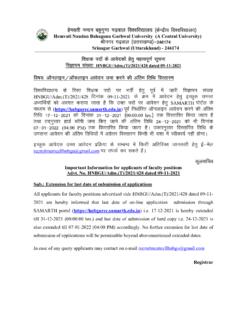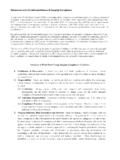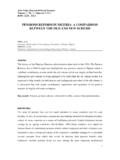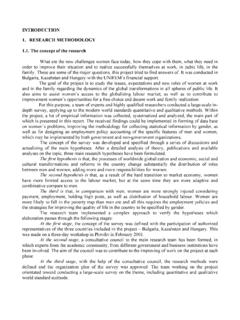Transcription of H.N.B. GARHWAL UNIVERSITY SRINAGAR …
1 SCHOOL OF COMMERCE Syllabus For All Courses in Commerce Examinations: 2013 and Onwards GARHWAL UNIVERSITY SRINAGAR GARHWAL (A central UNIVERSITY ) ORDINANCES (Three Year Degree Course) 1. (a) The examination for the degree of Bachelor of Commerce ( ) shall consist of three parts (i) Part I (ii) Part II (iii) Part III (b) A candidate who has passed the following examinations shall be eligible for admission to Part I: The Intermediate Examination of Commerce of the Board of High School and Intermediate Education, Uttaranchal or the central Board of Secondary Education or any other examination recognized by the UNIVERSITY as equivalent there to with a minimum of 40% marks in aggregate.
2 (c) A candidate who has not passed the Intermediate examination in commerce shall be required to pass an additional course on Elementary Book-keeping and Accountancy. It will be a Qualifying Course and shall be offered by those candidate who have not passed Book-keeping and Accountancy as a subject in Intermediate or equivalent examination. If a candidate has passed 1st year examination of the Three year Degree Course and has not offered Book-keeping & Accountancy as a subject, he/ she shall be required to offer this Qualifying Course . Marks obtained by him in the qualifying course shall not be added to the marks obtained by him in aggregate.
3 2. A candidate who has passed Part I/II Examination of another UNIVERSITY may also be admitted to part II/III. examination provided that he/ she has offered for his/ her part I/II examination of course of equivalent standard with almost identical syllabus as is required for part I/II examination of this UNIVERSITY and has attended a regular course of study for an academic year in constituent/ affiliated college of the UNIVERSITY . Prior Permission is necessary from UNIVERSITY with this regard. 3. (a) A candidate shall be examined in three groups of Part I / II examination and total four groups in III examination.
4 In III, Group V is compulsory for regular and private students. (b) There will be one Computerized Accounting Group Group - IV Computerized Accounting (Group - IV) can be opted by a maximum number of 30 students in I (to continue without change to II and III) in place of Group II Accounting Group. This group can be run only where appropriate computers laboratory and staff is available. Private students can not opt group of computerized accounting. Practical examination will be held in group IV as under: I Paper I Theory [50 max. marks] Paper II Theory 35 marks, Practical 15 marks [50 max.]
5 Marks] II Paper I Theory [50 max. marks] Paper II Theory 35 marks, Practical 15 marks [50 max. marks] III Paper I Theory 35 marks, Practical 15 marks [50 max. marks] Paper II Theory 35 marks, Practical 15 marks [50 max. marks] The Following shall be the number of paper in each group: Group No. of Papers Group Part I Part II Part III I 2 2 2 II 2 2 2 III 2 2 2 IV 2 2 2 V - - 2 (Compulsory Group) 4. In Part I, II & III examination, each group shall carry 100 marks. In order to pass Part I, Part II and Part III examination, a candidate must obtain 33% marks in each group and also in aggregate.
6 5. Each candidate shall have to pass the Part I, Part II and III examinations separately, but the division shall be awarded on the basis of the aggregate marks obtained by him/her in all the three examinations together. 6. A candidate who has obtained 33% marks and above but less than 45% marks in the aggregate shall be placed in III division, a candidate who has obtained 45% marks and above but less than 60% marks shall be placed in II division, a candidate who has obtained 60% marks and above shall be placed in I division. 7. In Part III, three grace marks in any one group shall be awarded on the basis of one mark on every 10 marks, over and above the minimum pass marks.
7 8. The details of the courses of each group of study shall be as contained in the syllabi and the existing regulations, to the extent they are inconsistent with the new ordinances and regulations, shall stand amended or superseded, as the case may be. SCHEME OF EXAMINATION (1) The examination for the degree of Bachelor of Commerce shall consist of Part I, Part II and Part III examinations spread over three years. B. Com. Part - I Examination, 2014 and onwards Group I Management Group Marks Paper I Principles of Management 50 Paper II Business Environment 50 Group II Accounting Group Paper I Financial Accounting 50 Paper II Business Statistics 50 Group III Business Economics & Legal Aspects of Business Paper I Business Economics 50 Paper II Business Laws 50 Group IV Computerized Accounting Paper I Financial Accounting 50 Paper II Computerized Financial Accounting 50 Qualifying Course (Only for Non commerce students who have passed class 12th with science or arts subjects and not studied commerce and accounts in class 12th)
8 Elementary Book-Keeping & Accountancy 50 Those who fail to pass this paper in B. Com. Part I shall be required to pass this paper either in B. Com. Part II or B. Com. III examination. Candidates shall not be awarded the degree unless they qualify in this paper or unless exempted. Minimum pass percentage is 33% in the group. If a candidate has passed any of the following courses of national Institute of Banking of chartered Accountants/ Cost & works Accountants/Company Administration/Management he/she will be exempted from appearing in the qualifying paper. Division will be assigned on the following basis:- First : 60% marks or above.
9 Second : 45% marks or above but below 60% marks Third : 33% marks or above but below 45% B. Com. Part - II Examination, 2015 and onwards Group I Management Group Marks Paper I Basic Business Finance 50 Paper II Personnel Management 50 Group II Accounting Group Paper I Cost Accounting 50 Paper II Corporate Accounting 50 Group III Business Economics & Legal Aspects of Business Paper I Money Banking and Financial Institutions 50 Paper II Legal Aspects of business 50 Group IV Computerized Accounting Paper I Cost Accounting 50 Paper II Computerized Cost Accounting 50 B. Com. Part - III Examination, 2016 and onwards Group I Management Group Marks Paper I Marketing Management 50 Paper II Management Accounting 50 Group II Accounting Group Paper I Income Tax Law & Accounts 50 Paper II Auditing 50 Group III Business Economics & Legal Aspects of Business Paper I Indirect Tax Laws 50 Paper II Fundamentals of Insurance 50 Group IV Computerized Accounting Paper I Computer Applications in Management Accounting 50 Paper II Computer Applications in Income Tax 50 Group V Communication group (Compulsory for all) Paper I Business Communication 50 Paper II Viva Voce (Oral Communication)
10 50 B. Com. - I Group I: Management Group Paper I: Principles of Management 1. Management Meaning, nature and importance, Different Schools of management thought. Contribution of Taylor, Henri Fayol and Elton Mayo. 2. Planning. Concepts, Types of plans, Process and limitations of planning. 3. Communication Concept, types and process, barriers to communication. 4. Organisation Departmentation, types of organisation, line, staff and functional organisation. 5. Staffing Recruitment, selection procedure, training methods, performance appraisal. 6. Motivation Meaning and importance, Financial and non-financial incentives.








